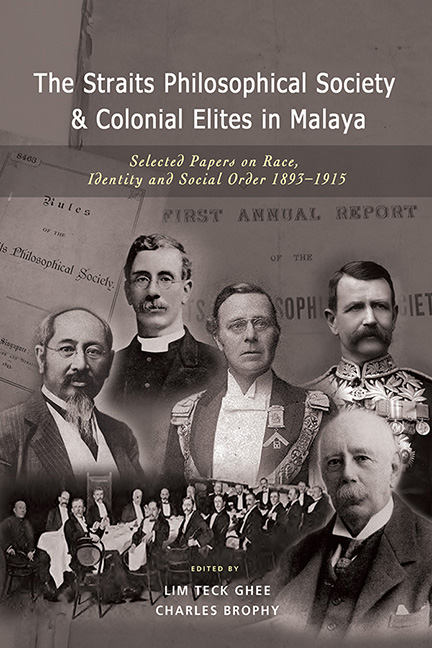 The Straits Philosophical Society and Colonial Elites in Malaya
The Straits Philosophical Society and Colonial Elites in Malaya 18 - Opium Versus Alcohol
Published online by Cambridge University Press: 09 January 2024
Summary
Editors’ Note
One important element of the social reform movement amongst the Straits Chinese was the anti-opium movement which called for the prohibition on the opium trade in the colony and treatment for opium smokers. As early as 1894, Straits Chinese members took the lead in representing the anti-opium cause at public meetings in Singapore. In doing so they challenged the view common in European circles, and expressed in the papers to the Society, that the Chinese community was averse to the banning of opium, Lim would continue to write on the issue in the Straits Chinese Magazine, seeing the issue as an opportunity to mobilize the Chinese community in Singapore. As highlighted in his paper to the Society, Lim was foremost in the use of medical arguments which highlighted the deleterious effects of opium, as well as in rebutting the belief that without opium, worse abuses would follow. Although he perceived that alcohol was no less an evil, Lim suggested that this abuse was less common amongst the Chinese, easier to detect, and more easily treated. Together with his brother-in-law, Yin Suat Chuan, he founded in 1906 the Singapore Anti-Opium Society, and ran an experimental rehabilitation centre funded by Baba merchants. This influenced Wu Lien-teh to establish a similar clinic in Penang, where an anti-opium movement also emerged. The movement was also supported by prominent missionaries active in the Straits Philosophical Society: W. Murray and William Shellabear, whilst D.J. Galloway would sit on the Opium Commission in 1908. The Commission studied the opium problem and put forward recommendations to restrict, but not to prohibit, opium, thereby protecting the colony’s revenues.
Lim’s essay and J.G. Campbell’s response highlight that, beyond moral reform and economic concerns, ideas of race and racial susceptibility to substances such as opium and alcohol were important to debates on social policy and reform.
Gentlemen, in my humble opinion, there is not much to choose between opium and alcohol, at least from the ethical and scientific point of view. It seems a great pity, indeed, that public discussion of the evil of the opium habit has led to the studious elaboration of facts and fancies into a very taking kind of hypothesis that as compared with alcohol-drinking the opium habit is, after all, a very desirable kind of virtue.
- Type
- Chapter
- Information
- The Straits Philosophical Society and Colonial Elites in MalayaSelected Papers on Race, Identity and Social Order 1893-1915, pp. 262 - 277Publisher: ISEAS–Yusof Ishak InstitutePrint publication year: 2023


